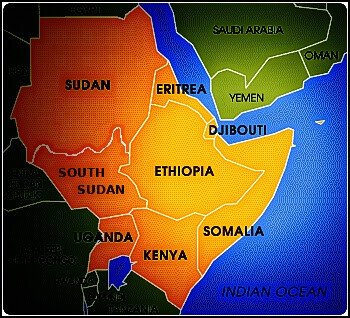By Dr. Suleiman Walhad
October 3rd, 2023
The Horn of Africa States owns a coastline of some 4,700 km. Saudi Arabia and Yemen in West Asia opposite the HAS region own together about 3,600 km, with Saudi Arabia owning about 1,760 and Yemen owning about 1,840 km. This makes the HAS region the owner of an extensive coastal belt longer than any other region in this geostrategic maritime space. The region’s Red Sea and Gulf of Aden, including the Bab El Mandab Strait is some 2,900 km, while its Indian Ocean coastline stretches for some 1,841 km. The coastal belt of the region forms one of the most strategically important waterways in the world, which handles some 20% of the world’s trade including about 11% of the world’s hydrocarbon trade.
The least involved in the management of this significant waterway to date remains to be its owners, the HAS region which has little to say in the security or exploitation of its marine resources of this waterway. There is no HAS institution, that directly handles these waters, and actors from near and far including China, the United States, Europe and other smaller countries such as the UAE play significant roles in this maritime space with military and naval presence.
Through recommendations of the UN and other interested parties from beyond the region, a Red Sea Council was created in 2020, which comprised eight coastal countries including four Arab countries namely Egypt, Saudi Arabia, Jordan, and Yemen, and four African countries namely Sudan, Eritrea, Djibouti, and Somalia. The institution which appears to have been spearheaded by some Arab countries, mostly Saudi Arabia, has not achieved much and remains more like dry ink on paper (See: Managing Security in the Red Sea and the Gulf of Aden by Elin Hellquist and Samuel Neuman Bergenwall, February 2023).
The Intergovernmental Authority on Development, one of those numerous NGOs operating in the region and comprising other countries that are not part of the HAS region, indeed, created a task force called the IGAD Taskforce on the Red Sea and the Gulf of Aden on the recommendation of the 46th Ordinary Session of IGAD in February 2019 in Djibouti with the aim of promoting “regional cohesion, coordination, cooperation and the possibilities for IGAD’s regional economic integration”. Three of the countries in IGAD are already in the East Africa Community, where they have commitments, that require their adherence to, and which would, therefore, not enable fulfillment of this wishful thinking of IGAD.
IGAD is, indeed, an NGO that works on financial assistance and hence on the behest of countries like Finland, Norway, and other organizations like the European Union. It is not, indeed, an indigenous entity that is financed by the member countries, but which is used as a begging bowl. This is why it is necessary for the SEED countries to create a new organization like the “HAS” to work not only on the Red Sea and the Gulf of Aden but also on many other fronts that the region needs.
The Red Sea Council or other institutions created with respect to this waterway mostly deal with security and security matters as it is one of the major enablers of maritime trade across the globe. The waterway, however, also presents a significant space for the development of a maritime economy that is necessary for advancing the region’s prosperity, in terms of food security, exploitation of its offshore mineral base such as oil and gas, construction of major coastal cities with facilities for not only catering for trade ships but ship repairs and shipbuilding, tourism, airports and others. Such developments would assist in creating stability in the region, peace, and barriers against transnational crimes such as terrorism in all its shades.
Most of the projects so far on the Red Sea and the Gulf of Aden seem to be funded by parties from afar, with little financing coming in from the owners of the coastline. Unless the countries of the region come to collectively finance projects in the region, it would always be at the mercy of the others with diametrically opposed goals that are not of interest to the region.
The HAS region would, therefore, need to create its own maritime institution to handle the building of local capacities in dealing with maritime issues. We know the individual countries of the region seem to be currently out of shape economically, but putting resources together helps, and this should be the direction the authorities of the region should be taking. Lately, there has been news on Ethiopia lamenting its lack of a coastline and its desire to have one. Ethiopia, the largest country in the region should have been spearheading the creation of a HAS region which should benefit it more than it hopes for. The reference to obtaining a coastline through hard persuasion or force was an ill-thought-of concept or idea, if true.
We know that West Asian states like the UAE, Saudi Arabia, Qatar, and even far-off Turkey are playing significant roles in the seas and oceans of the HAS region in addition to the other major players of the world such as China, the USA, and the European Union. It is perhaps time the HAS region collectively started working on establishing its own institutional framework for not only addressing its maritime security but also harnessing its resources for the benefit of its populations.
We should note here, perhaps, the significance of the region. It is in close proximity to the hydrocarbon-rich West Asia, the major chokepoint of the Bab El Mandab, and further north, the Suez Canal, It is also close to the equally rich East Africa and is open to the northern Indian Ocean, the Somali Sea. This strategic location attracts many a nation, including not only the great powers of today but also smaller regional powers that have an interest in the region. It is, therefore, necessary for the region to protect itself from the prying influences of others who do not have the best interest of the region at heart, as has been the case with many who ventured into the region in the past.
The Horn of Africa States need to concentrate on building a blue economy that would add to the already rich other potential resources of the region. The fact that it is in a geostrategic location and its varied weather help. The region should be using its coastal belt and oceans to develop sustainable projects that would assist not only in employing its bulging youth but also in adding to its coffers.






















Another well researched masterpiece by Brother Dr. Suleiman Walhad. I have been bookmarking his articles since the first time I had the privilege to read them.
Thank you sir, for educating us.